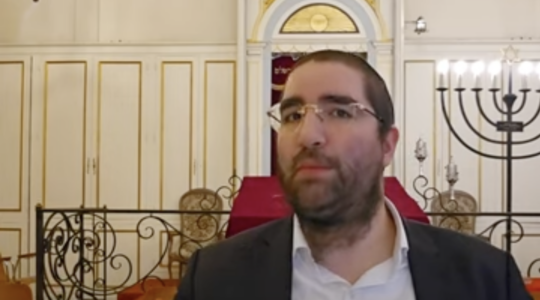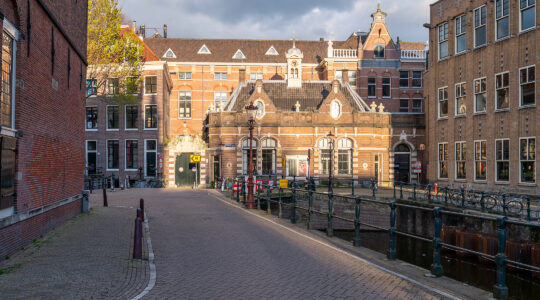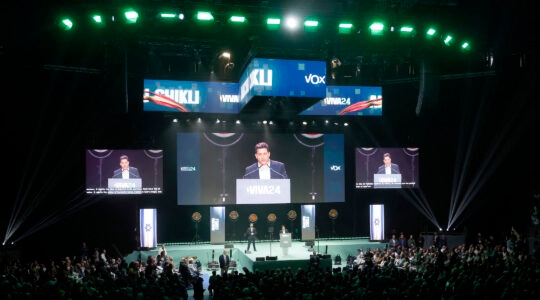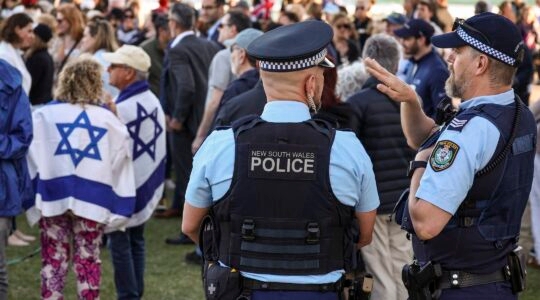MUMBAI, India (JTA) – About 500 well-wishers gathered recently around Isaac Divekar and Siyona Garsulkar at their outdoor catered wedding reception at the Elie Kadoorie School here.
Divekar, an accountant for a large investment firm, and Garsulkar, a human resources professional, had just married at one of this city’s noted synagogues, Magen Hassidim, built in 1931.
Unlike many young Indian Jewish couples who, in previous years, often left the country in search of greater opportunity and Jewish life elsewhere, this young couple will be staying put in Mumbai.
“There are more job opportunities in India now,” said Divekar, citing call centers and outsourcing from the United States. Young Jews “are staying in India and not emigrating.”
Divekar and his wife epitomize the new India and its revived Jewish community of nearly 5,000, most of which lives in this metropolis of 19 million formerly known as Bombay.
Seeing a bright future in their native land, young Indian Jews increasingly are remaining in India, which has the world’s fastest growing major economy after China. India’s 9 percent growth rate in 2007 was four times that of the United States and nearly twice that of Israel.
Last year, only 49 Jews left the community for Israel, down from 291 in 2006 – though the latter figure included the 229 Bnei Menashe from northeast India, according to Ze’ev Schwartzberg, head of the Ethiopia and India desk of the Jewish Agency for Israel’s aliyah department.
Schwartzberg said 90 Indian Jews left for Israel in 2004 and 143 the previous year. India’s booming economy and the Arab-Israeli conflict are keeping aliyah down, he said.
The Jewish population in India “has remained stable,” said Elijah Jacob, the American Jewish Joint Distribution Committee country manager in India, citing a total of 4,480 Jews in India. Approximately 3,700 reside in Mumbai and nearby Thane. The balance live in the Konkan villages, Pune, Ahmedabad, Kochi (Cochin), Delhi and Calcutta.
Young Indian Jews like Divekar and Siyona have witnessed the economic boom overtaking the subcontinent.
“Never has there been a better time to have been born in India,” seems to be the country’s motto, uttered on Indian television almost every day.
With a population of about 1.15 billion, India, like China, has capitalized on its educated workforce to become a major exporter of high-tech, financial and other services.
Most young Jews are educated in Indian schools where English is the language of instruction and are highly proficient in English and technology. They see their country as a place of opportunity, especially in high-tech jobs and “call centers which pay extremely well,” according to Antony Korenstein, country director of the JDC in India.
“Jews are sharing in and riding the economic wave,” Korenstein said.
Many young Indian Jews work in high-tech industries and financial services, whereas their parents tended to work as family business owners, company directors, lawyers and bank clerks.
The parents “certainly are not poor, though very few are truly wealthy,” Korenstein said.
Jews live in the cities where incomes are rising fast to catch up with international standards and reflect a higher standard of living.
With the call centers providing jobs for young adult Jews at night – it’s daytime in the United States – synagogue leaders say it is difficult to attract them to activities. They sleep during the day and are working at night.
Divekar says that Jews are allowed time off from work for Jewish holidays and festivals.
Jews have been a part of the Indian mosaic for more than two millennia. This “land of the Ganges” was known to the Jews of antiquity as well as to those of the Middle Ages. The Talmud contains several references to India.
During the 12th century, a number of Jewish travelers, including Benjamin of Tudela, wrote about Jewish life here.
In 1948, some 30,000 to 40,000 Jews resided in India, but most left for the new State of Israel in the following few years. Still, India boasts the largest number of indigenous Jews of any country east of Iran.
Not only are young Jews staying in India, a few Jewish families have returned from Israel.
Israeli-born Anil Abraham, 31, is now a tour operator in Kochi, where he has relatives. Although he hasn’t made up his mind to stay, Abraham says that “life is different here compared to Israel,” citing the “pressures of security and job there.”
“I love this place,” he added.
The Mumbai Jewish community appears to be active, with nine functioning Sephardic Orthodox synagogues, but only two rabbis.
A Reform congregation, JRU, meets at the Evelyn Peters Jewish Community Center. The JCC, which receives JDC assistance, houses a meeting room for young people, a popular computer facility and a library that hosts a religious school program for children.
JDC provides seniors and needy Indian Jews with monthly cash assistance, medical programs and medications. It also sends young Indian Jews for leadership training courses abroad and sponsors two Jewish Service Corps volunteers, Reuben Posner of Baltimore and his wife, Leila Bilick, originally from Teaneck, N.J. They teach in the religious school that meets weekly in Mumbai and biweekly in Thane, and also have started adult-education classes.
Natasha Joseph, 20, an editor at the new magazine Kol India, is active in the Jewish community. She cites the myriad Jewish activities in Mumbai: the Khai Fest, a Chanukah festival sponsored by The Jewish Youth Pioneers; communal Passover seders in the city and elsewhere; children’s day camps; and youth leadership programs.
The community held a large Israel Independence Day celebration in the Magen Hassidim pavilion and a Holocaust Memorial Day commemoration at the JCC.
JTA has documented Jewish history in real-time for over a century. Keep our journalism strong by joining us in supporting independent, award-winning reporting.





